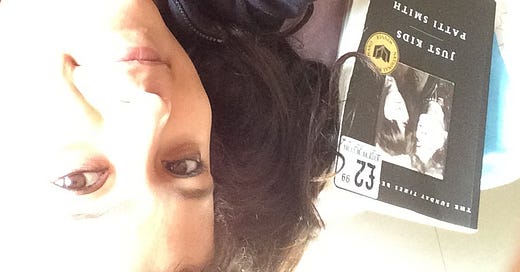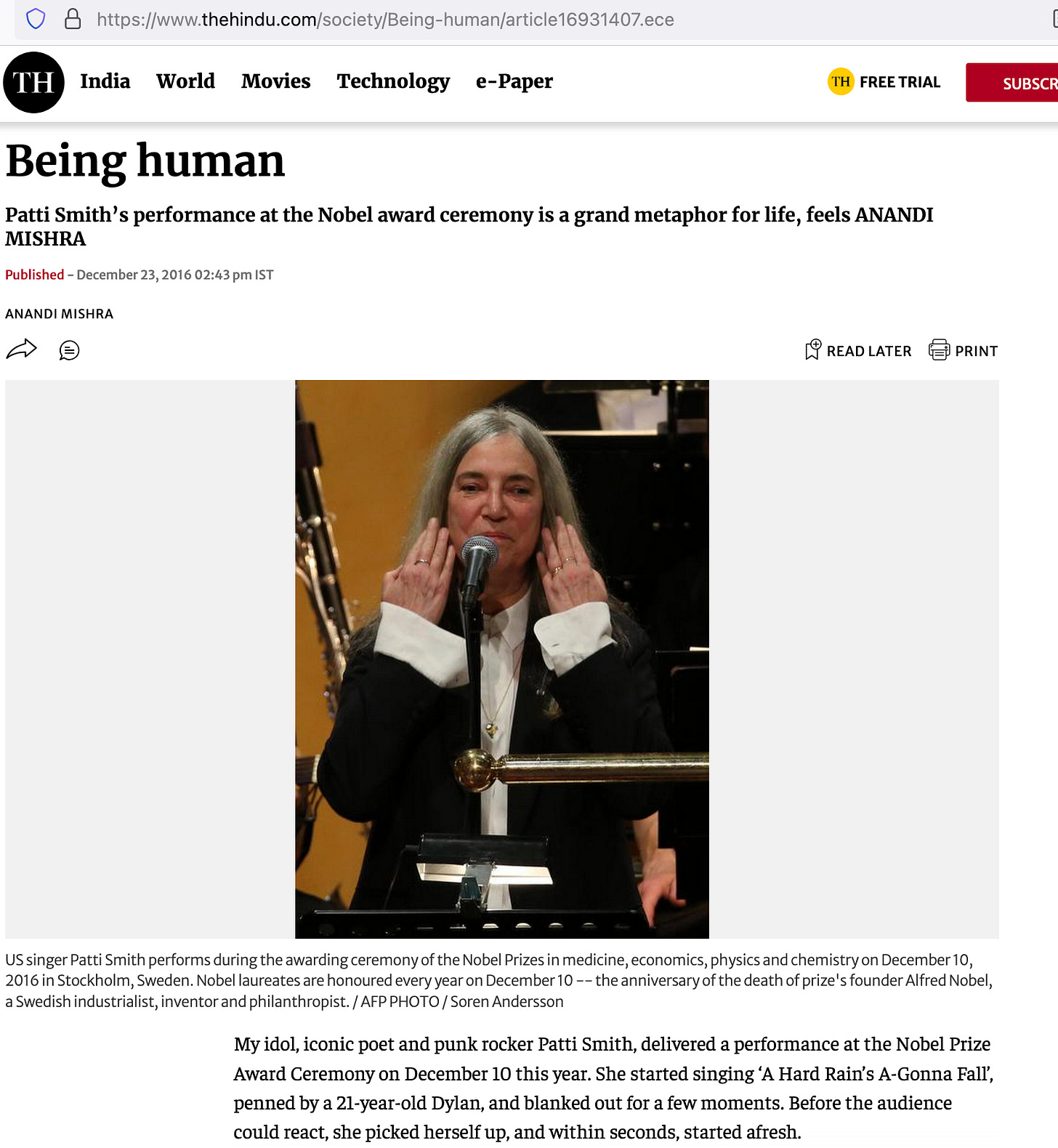#Scurf191: On Patti Smith (from 2016) 💌
When Patti Smith performed Bob Dylan's "A Hard Rain's A-Gonna Fall" at the Nobel Prize Award Ceremony 2016, misty-eyed me wrote about it for The Hindu
As yet another Dylan biopic trailer hits youtube, it’s got so many of us to think and talk about our favourite Dylan song(s). While the jury is still out for my favourite Dylan poem, Patti Smith’s rendering of Dylan’s A Hard Rain's Gonna Fall remains my cornerstone of living a writer’s life (more on Joan Baez some other time). So, here’s a little snatch of a reported piece I wrote for The Hindu as a reporter back in 2016.
I remember going back and forth on email with my friend, K, on drafts of this piece, before I sent it to my chief of bureau. K had patiently pointed out places in my piece that moved him and sent over edits for places where I could improve. An exercise in absolute trust and mutual admiration, belonging. I’m largely content reading it eight years after, there are parts where my naive former self slips through and the hopefulness, despite it all, shines. The writing as a container of my former self which I continue to carry within. The process of writing, perfecting this little 500-600 word dirge held so much meaning for me; it is still one of the most delicate pieces of writing I’ve given myself to.
Smith wrote about her performance for the New Yorker afterwards:
I hadn’t forgotten the words that were now a part of me. I was simply unable to draw them out.
This strange phenomenon did not diminish or pass but stayed cruelly with me. I was obliged to stop and ask pardon and then attempt again while in this state and sang with all my being, yet still stumbling. It was not lost on me that the narrative of the song begins with the words “I stumbled alongside of twelve misty mountains,” and ends with the line “And I’ll know my song well before I start singing.” As I took my seat, I felt the humiliating sting of failure, but also the strange realization that I had somehow entered and truly lived the world of the lyrics.
Being Human by Anandi Mishra in The Hindu - December 23, 2016
My idol, iconic poet and punk rocker Patti Smith, delivered a performance at the Nobel Prize Award Ceremony on December 10 this year. She started singing ‘A Hard Rain’s A-Gonna Fall’, penned by a 21-year-old Dylan, and blanked out for a few moments. Before the audience could react, she picked herself up, and within seconds, started afresh.
“I apologise, I’m sorry. Can we start over? I’m so nervous,” she said — a smile on her face with an admission of guilt in her eyes. The orchestra conductor agreed and she picked up from where she had trailed off.
Patti Smith’s blackout lent the the Nobel ceremony hall a moment of humanity. An atmosphere that was entirely in line with the text of the song she was singing. A song about people’s vulnerability in a harsh and cold world. What keeps one going is the fact that we accept them, take responsibility for them, and move on. Allen Ginsberg had remarked on Bob Dylan’s work: “It’s not only surrealistic, it’s very logical; it’s realistic and naturalistic. It could almost pass for somebody talking; you almost might not notice that it’s poetry.” With this performance, lessons on picking oneself up in the face of adversity were brought to life — quite literally.
Everything in the performance is emotion articulated, caught on camera, performed, and real. If I told you it was staged, you might even believe me. The performance easily transcends boundaries. It is a grand metaphor for life. A dossier on humanity and what it is to be human, Patti’s performance has become one of the iconic moments of 2016. It pushes us to own up to our faults, and just say, “Sorry, something went wrong. Can we start over?” All of this, especially in a year as dystopic as 2016 — when Trump won, and the world lost Leonard Cohen, Alan Rickman, David Bowie and Prince. The dreamers and believers had given up hope when the news of Dylan winning the Nobel arrived. He did not comment, or answer calls for a long time, and only later issued a statement saying that he was overwhelmed to be counted amidst other laureates.
Five days after the performance, Patti wrote a piece for The New Yorker , titled ‘How Does it Feel’. She talks about how her mother bought her the first Dylan album when she was 16. She talks about stage jitters that happened because of the overwhelming nature of the occasion. She talks of how she wished that she could have done better. Doubting herself, at times, she pauses and lends a ear to what the others have to say about her. This tells us that it is in such moments that one should turn to the outside world to know more about themselves. And Patti does find words that calm the storm within. Nobel prize winning scientists tell her that she did a good job. “For us, your performance seemed a metaphor for our own struggles,” they tell her.
On the stage, the purpose of real art is served — it stands out and trickles into the collective memories of the audience, onlookers, YouTubers and fans as an undated relic people would want to keep going back to. The difference between high art and throwaway entertainment is evident in these eight minutes.
All along, she makes us question why is it that we do what we do. She makes us think about the reason for the existence of rationale and reason. She makes us think that it is okay to be flawed; those mistakes make us more human.
And, at the end of the article, she says, “It occurred to me then that, although I did not live in the time of Arthur Rimbaud, I existed in the time of Bob Dylan.” That’s how I woke up to the realisation that we are lucky enough to be alive in the time of Patti Smith.
Amidst the pompous, chest-thumping, overbearing names and caricatures, when I see Smith perform, I see a beam of light. Willy Wonka left us with smudged eyes and hopelessness, and so did the ‘float like a butterfly, sting like a bee’ three-time world heavyweight champion Muhammad Ali. It’s in times like these, when the world says times are tough for dreamers, that Patti’s performance is a reminder that humanity is anything but perfection. 🔵
Read the original piece here: https://www.thehindu.com/society/Being-human/article16931407.ece
For the uninitiated, Smith now writes her own poetic, routine Substack:
Anandi is a writer living in New Delhi.






